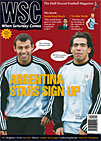 Managers may not like it but there are legal limits to what a footballer can do to an opponent. As the police investigate Ben Thatcher's challenge on Pedro Mendes, Neil Rose looks at where the law stands
Managers may not like it but there are legal limits to what a footballer can do to an opponent. As the police investigate Ben Thatcher's challenge on Pedro Mendes, Neil Rose looks at where the law stands
“Anything that happens on a football pitch should be governed by the FA and FIFA,” said Stuart Pearce following Ben Thatcher’s challenge on Pedro Mendes. “Once you start involving the police, the floodgates can open and you could end up with a situation where players are arrested during a game.”
Pearce was no doubt echoing the views of most in the game, but his cri de coeur is more than a century too late. In 1898 a player was found guilty of manslaughter for jumping with his knees up against an opponent’s back and throwing him violently on to the knees of the oncoming goalkeeper, causing fatal internal injuries.
But it is in the past 20 years that the law – both criminal and civil – has crossed the touchline with increasing regularity. In 1988 Chris Kamara became the first player fined in court for an assault (in this case an elbow) on another professional during a match. It was the evidence of then FA chief Graham Kelly that is thought to have got Brentford’s Gary Blissett off a similar charge in 1993. Kelly testified that the aerial challenge on Torquay’s John Uzzell was the kind he would see in every game.
Yet there is a fair list of those found guilty, with Lee Bowyer joining players such as Duncan Ferguson after pleading guilty in July to a public-order offence following his on-field bust-up with Kieron Dyer. The chief crown prosecutor for Northumbria said: “The criminal law doesn’t cease to operate once you cross the touchline of a sports field. Neither does being disciplined by an employer or a sport governing body make an athlete immune to the law.”
That in essence is where the law stands, but there is some leeway. The Lord Advocate, Scotland’s chief prosecutor, issued guidelines a decade ago that make it clear that the sport itself has the initial and major responsibility to deal with excessive violence or serious disorderly conduct on the part of participants.
Plus, of course, football is a contact sport and players consent to that contact taking place. It spills over into a potential crime, the guidelines explain, “where the violence used goes well beyond what can be regarded as normal physical contact for the sport concerned, no question of consent arises and an assault may have been committed”. What “well beyond” means is open to argument, but a likely example would be going up to a player while the ball is dead and punching him. Thatcher’s conduct is not as clear cut, but he may still be sweating on the outcome of the police investigation.
There are no published guidelines south of the border, but last year the Crown Prosecution Service held a “Crime in Sport” conference at which it indicated that it would review its policy on prosecutions, including in relation to on-field racial abuse. The growing feeling among the public, the conference was told, is that footballers are getting away with crimes.
It is similar when players sue for damages following career-threatening tackles. Some have succeeded, most famously Bradford’s Gordon Watson, who won more than £900,000, while the most high-profile failure was Paul Elliott against Dean Saunders. To be successful, the injured player has to prove that his opponent acted deliberately (usually hard to do), recklessly or negligently. The last two are related and largely a question of degree – an analogy is dangerous and careless driving – and again hard to prove as challenges are part of the game. Clare Hoskins, a lawyer at Cardiff firm Dolmans, says: “The question is likely to be one of deciding the extent to which the player’s conduct departed from the usual conduct to be expected in the game.” You would also need to prove that the player should have foreseen that he would cause serious injury.
The hurdles are high and it is no surprise that Mendes has decided against legal action – although Hoskins points out that he could also have argued that Manchester City had failed to address Thatcher’s history of making bad challenges. In any case, she seems in little doubt that this area of the law will continue to grow, with clubs suing an opponent for the loss of an injured player one new direction in which it could go. With player values and salaries spiralling ever higher, the stakes are too high for it not to.
From WSC 236 October 2006. What was happening this month